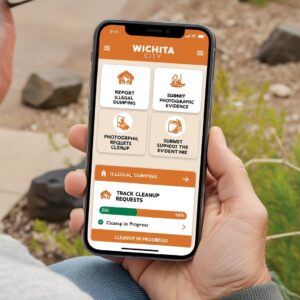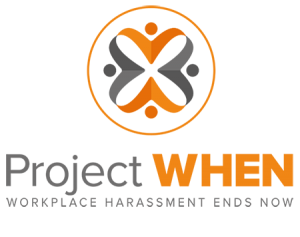Take Pride Wichita: A Case Study on Fighting Illegal Dumping Through Community-Centered Communication and Services
 Illegal dumping isn’t merely a sanitation issue—it is a complex problem rooted in public health disparities, environmental injustice, and socio-economic marginalization. In cities across the United States, the accumulation of discarded furniture, tires, appliances, and construction debris in alleyways and vacant lots contributes to a cycle of neglect and disinvestment. In Wichita, Kansas, the issue became especially prevalent in historically underserved neighborhoods, prompting a reevaluation of traditional code enforcement models.
Illegal dumping isn’t merely a sanitation issue—it is a complex problem rooted in public health disparities, environmental injustice, and socio-economic marginalization. In cities across the United States, the accumulation of discarded furniture, tires, appliances, and construction debris in alleyways and vacant lots contributes to a cycle of neglect and disinvestment. In Wichita, Kansas, the issue became especially prevalent in historically underserved neighborhoods, prompting a reevaluation of traditional code enforcement models.
Recognizing the need for a more nuanced, community-first approach, the Wichita Public Works & Utilities Department launched Take Pride Wichita in 2021. More than just a clean-up campaign, Take Pride Wichita blends accountability with empathy, leveraging communication and services to drive behavioral change, restore public spaces, and rebuild neighborhood pride.
This case study explores the campaign’s development, implementation, communication strategies, community partnerships, measurable impacts, and broader relevance as a replicable model for other municipalities facing similar challenges.
The Initiative: Take Pride Wichita
Program Vision and Background
The launch of Take Pride Wichita was not a reactionary measure, but the culmination of years of escalating resident complaints about illegal dumping, particularly in lower-income areas such as South Central, Planeview, and Northeast Wichita. These communities had long struggled with visible environmental neglect, fueling a sense of abandonment and eroding trust in public systems.
The program was built around a simple but powerful triad:
- Enforcement – to discourage chronic dumping through strategic monitoring and clear consequences.
- Education – to inform residents of the environmental impact of dumping and provide accessible disposal alternatives.
- Empowerment – to equip residents with the tools, information, and community support they need to reclaim their neighborhoods.
This holistic approach intentionally shifted away from punitive strategies that disproportionately impact low-income communities. Instead, Take Pride Wichita sought to frame dumping not as a criminal failing, but as a solvable infrastructure and communication challenge.
Communication-Driven Infrastructure and Strategy
Messaging: Accessible, Solution-Oriented, and Shame-Free
One of the most distinctive features of Take Pride Wichita was its communication strategy. The city took great care to ensure that campaign messages were clear, culturally resonant, and devoid of blame. The objective was not to shame residents into compliance but to inspire pride and participation.
The campaign slogans—“Report it. Remove it. Take Pride.” and “Your neighborhood. Your voice. Your power.”—emphasized empowerment and collective responsibility. These were not just slogans; they reflected a shift in tone and intent, signaling that the city was ready to partner with residents rather than police them.
To reach diverse audiences, the city deployed a variety of communication tools, including:
- Yard signs and banners strategically placed in known dumping hotspots.
- Flyers distributed through community centers, schools, and places of worship.
- Social media campaigns showcasing volunteer-led cleanups and “clean-up champions” from within the community.
- Multilingual PSAs, including radio spots and translated hotline materials, to ensure inclusivity.
Why It Worked:
The success of Wichita’s messaging strategy can be attributed to its careful avoidance of shame-based language. Too often, public campaigns addressing issues like illegal dumping resort to messaging that inadvertently blames or scolds residents, which can alienate those who already feel disconnected from civic life. Instead, Take Pride Wichita focused on solution-oriented and positive language that emphasized pride, ownership, and community collaboration.
Moreover, the communications team ensured the campaign was culturally relevant and inclusive, using multilingual materials and spotlighting real community members as “clean-up champions.” By presenting illegal dumping as a solvable issue rather than a community failing, Wichita set a new standard for empathetic and inclusive environmental messaging.
Surveillance, Reporting Tools, and Resident-Led Monitoring
Rather than relying solely on city inspectors, the campaign emphasized resident-driven reporting and monitoring. Surveillance cameras—more than 20 of them—were strategically placed in dumping-prone areas, but these were part of a broader toolkit designed to empower residents, not just surveil them.
To support community involvement, the city introduced:
- A 24/7 illegal dumping hotline, staffed and responsive, to receive complaints and tips.
- A mobile app that allowed users to report dumping incidents, submit photos, and track clean-up progress in real time.
- Neighborhood liaisons—local residents hired or designated by neighborhood associations—who served as on-the-ground communicators and solution brokers.
Why It Worked:
What set Take Pride Wichita apart was its ability to balance enforcement with trust-building. Surveillance and reporting tools were not used punitively but rather as tools of empowerment, allowing residents to become active participants in shaping their environments.
This participatory model encouraged a shift from passive observation to active problem-solving. By giving residents tools to be part of the cleanup—not just to complain about it—the city helped instill a deeper sense of ownership. This two-way street of accountability fostered stronger relationships between citizens and local government.
Accessible Services for Legal Disposal
One of the key reasons residents engage in illegal dumping is simply lack of access to legal alternatives. Wichita acknowledged this structural barrier and expanded services accordingly.
To reduce the friction of legal disposal, the city offered:
- Free bulky item pickups (up to five items per household per month), with simplified scheduling and reminders via text and email.
- Monthly mobile collection events hosted directly in affected neighborhoods, timed to coincide with community events or weekends.
- Drop-off convenience centers with extended hours, including evenings and weekends, for greater flexibility.
- Community clean-up kits, distributed to neighborhood associations, including gloves, bags, signage, and instructions.
Why It Worked:
One of the most critical reasons Take Pride Wichita succeeded was because it removed logistical and financial barriers that had previously made legal disposal difficult or impossible for some residents. Wichita’s decision to offer free bulky item pickups, mobile drop-off events, and extended-hours convenience centers meant that legal options were finally more convenient than illegal ones.
To promote these services, city staff conducted door-to-door outreach, attended neighborhood meetings, and disseminated information through text alerts, translated flyers, and councilmember newsletters.
The act of providing clean-up kits further reinforced the message that the city trusted residents to care for their own spaces if given the means. In sum, the city didn’t just tell people not to dump—it made sure they had viable, dignified alternatives that were free, nearby, and easy to use.
Community Engagement and Public Awareness
Neighborhood Associations and Volunteer Involvement
At the heart of the Take Pride Wichita campaign was a belief that lasting change comes from within communities themselves. The city collaborated with over 30 neighborhood associations to co-design and roll out the campaign. These groups played critical roles in:
- Identifying chronic dumping locations and recommending camera placements.
- Hosting and promoting local clean-up events.
- Encouraging neighbors to download the app, attend meetings, and use available services.
The city also launched the “Take Pride Volunteer Corps”, which quickly grew to over 500 members. Volunteers participated in clean-up drives, educated their neighbors on proper disposal, and served as ambassadors of the campaign’s values.
Why It Worked:
The long-term sustainability of Take Pride Wichita is directly tied to the deep community integration and engagement built into the program’s DNA. Rather than functioning as a top-down initiative, the campaign partnered with neighborhood associations, schools, and community volunteers to make anti-dumping efforts locally owned.
These local touchpoints became amplifiers of the city’s message, increasing the campaign’s reach and authenticity.
Local Schools and University Engagement
The campaign wasn’t limited to adult residents—it also sought to foster a sense of environmental stewardship among youth and future leaders. In partnership with Wichita State University and USD 259 (the local school district), the city embedded environmental education into existing curriculum and extracurricular programs.
Students participated in:
- Service-learning projects, including neighborhood cleanups and waste audits.
- Art and design contests for campaign materials, signage, and social media graphics.
- Field trips to recycling centers and public works facilities, offering insight into the broader waste management system.
This outreach created early investment in the health of the city’s neighborhoods and helped ensure long-term cultural shifts around waste disposal and environmental justice.
Results and Measurable Impact
1. Reduction in Illegal Dumping
The campaign yielded immediate and visible results. In the first year alone:
- Illegal dumping complaints decreased by 22% across the city.
- Over 1,000 hotline calls and app-based reports were received and acted upon.
- More than 50 high-dumping sites were cleared, beautified, and placed on regular monitoring schedules.
These metrics demonstrated that the campaign was not only reaching residents but successfully changing behavior and expectations.
2. Increased Community Engagement
One of the most encouraging outcomes was the rise in civic participation. Wichita witnessed:
- A doubling of clean-up events in historically underserved neighborhoods.
- A 60% increase in volunteer sign-ups for ongoing cleanup efforts and outreach.
- Survey results showing a measurable increase in resident satisfaction, particularly in communities that had long felt overlooked.
Residents who once saw the city as unresponsive now saw themselves as part of the solution—and felt valued as such.
3. Increased Legal Waste Disposal
The program also drove meaningful increases in the use of legal disposal services, including:
- A tripling of bulky item pickup requests from low-income zip codes.
- Over 200,000 pounds of waste collected through mobile events in the first 12 months.
- Significantly increased convenience center usage, particularly in neighborhoods that previously had low access or awareness.
This shift in behavior proved that when services are designed with empathy and accessibility, residents are eager to comply.
 Takeaways: What Other Cities Can Learn
Takeaways: What Other Cities Can Learn
Communication Must Be Empathetic and Actionable
Too often, public messaging around dumping or environmental violations is punitive and alienating. Wichita’s approach—positive, inclusive, and action-oriented—proved that empathy drives engagement. By featuring local faces, highlighting success stories, and offering simple steps to get involved, the campaign inspired trust and participation.
Provide Tools, Not Just Rules
Accountability only works when people are given the tools they need to succeed. By removing logistical and financial barriers to legal disposal, the city created a system where compliance was the easy choice, not the costly one. Education, pickup services, and clean-up kits all played a role in replacing apathy with agency.
Neighborhood Collaboration Creates Sustainability
Programs are most sustainable when the community owns them. Wichita embedded the Take Pride ethos into the fabric of local organizations, schools, and volunteer networks—ensuring the work would continue even after the initial launch. Community buy-in was the engine that drove both results and longevity.
Conclusion: Take Pride as a Replicable Model
Take Pride Wichita is more than a beautification campaign—it is a blueprint for how cities can reimagine public service through the lens of equity, empowerment, and engagement. By pairing accessible services with inclusive communication, the city not only cleaned up its streets but also strengthened the civic contract between government and residents.
As more cities grapple with environmental justice, aging infrastructure, and distrust in public institutions, Wichita’s model offers a way forward. It shows that solving big problems requires more than big budgets—it requires listening, partnering, and leading with compassion.
Ready to Elevate Your Agency’s Public Communication?
We understand the unique challenges state and local government agencies face—from complex issues to diverse community needs. Our comprehensive approach can help you transform the way you connect with constituents, improve transparency, and highlight the valuable work your agency does every day.
Interested in learning more? Reach out to us today for a consultation. We’d love to discuss how our services can support your goals and help you build lasting trust with the communities you serve.



 Takeaways: What Other Cities Can Learn
Takeaways: What Other Cities Can Learn

